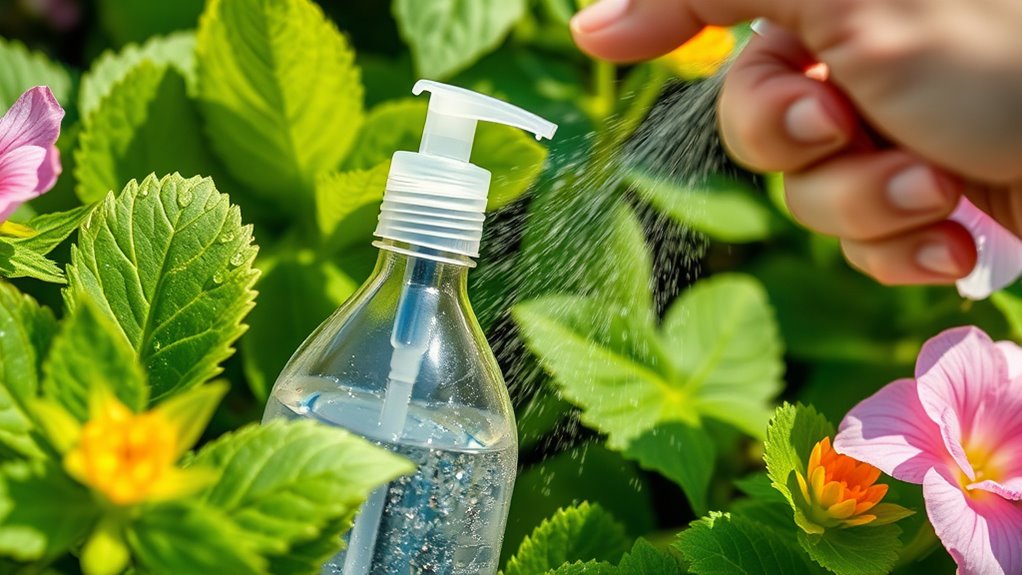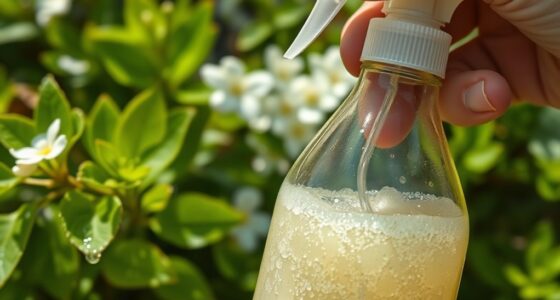To create a DIY natural insecticide, mix 1-2 teaspoons of mild liquid or castile soap in a quart of water. Spray it thoroughly on affected plants, focusing on pest hiding spots like undersides of leaves. Repeat every few days or after rain for best results. This eco-friendly spray targets pests without harming beneficial insects or leaving harmful residues. Keep exploring to discover more tips for a healthy, pest-free garden.
Key Takeaways
- Soap sprays effectively target pests’ exoskeletons, causing dehydration and death without harming beneficial insects.
- Use mild liquid or castile soap mixed at 1-2 teaspoons per quart of water for safe, DIY insecticide solutions.
- Apply thoroughly on affected leaves, especially undersides, every few days or after rain for sustained pest control.
- Incorporate compost tea to boost soil health, plant resilience, and attract natural predators of pests.
- Consistently monitor and adapt soap spray treatments to maintain a healthy, pest-free garden ecosystem.

Are you tired of using chemical insecticides that harm your garden and the environment? If so, it’s time to contemplate a natural approach that’s safe for your plants, beneficial insects, and the planet. One effective method is making your own soap sprays, which act as gentle but powerful insect repellents. These DIY solutions are simple to prepare, inexpensive, and customizable to target specific pests. Plus, incorporating ingredients like compost tea can boost your garden’s health while deterring unwanted insects.
Soap sprays work by breaking down the exoskeletons of pests like aphids, mites, and whiteflies, causing them to dehydrate and die. Unlike chemical options, they don’t linger in the environment or harm beneficial insects such as ladybugs, lacewings, and pollinators. These beneficial insects help control pest populations naturally, creating a balanced ecosystem that reduces the need for intervention. To support them, avoid broad-spectrum insecticides and instead focus on targeted, homemade solutions. Using compost tea as part of your spray adds nutrients and beneficial microbes to your plants, promoting stronger, healthier growth. This mixture encourages beneficial insects to thrive, creating a natural defense system within your garden.
Soap sprays target pests’ exoskeletons without harming beneficial insects, promoting a healthy, balanced garden ecosystem.
Creating your own soap spray is straightforward. You only need a few ingredients: mild liquid soap or castile soap, water, and optionally, compost tea or other natural additives. Mix about one to two teaspoons of soap per quart of water, ensuring the soap is free of degreasers or added chemicals that could harm plants or beneficial insects. For an extra boost, add a small amount of compost tea, which enriches the soil and supports a diverse array of beneficial microbes and insects. When applying, spray thoroughly on affected leaves and stems, making sure to cover the undersides where pests often hide. Repeat every few days or after rain to maintain effectiveness.
Using soap sprays regularly helps keep pest populations in check without disrupting the natural balance of your garden. The inclusion of compost tea not only enhances plant resilience but also attracts beneficial insects that prey on pests. This creates a sustainable cycle: healthy plants attract beneficial insects, which in turn keep pests at bay. Remember, the key is consistency and observation. Adjust your sprays based on pest activity, and always prioritize gentle, eco-friendly methods to protect your garden’s delicate ecosystem. With a little effort and some homemade soap spray magic, you can enjoy a thriving, pest-free garden that’s safe for everyone, including the beneficial insects that make natural pest control possible.
Frequently Asked Questions
How Long Does Homemade Soap Spray Last Once Prepared?
You probably wonder how long your homemade soap spray stays effective. Usually, its storage duration is about one to two weeks if kept in an airtight container in the refrigerator. The shelf life depends on the ingredients and storage conditions. To guarantee maximum potency, make small batches and use them promptly. Discard any leftover spray after this period to avoid reduced effectiveness or potential spoilage.
Can Soap Sprays Harm Beneficial Garden Insects?
You might wonder if soap sprays harm beneficial garden insects. While soap spray toxicity is generally low, it can affect beneficial insects if applied excessively or during the day when insects are active. To guarantee beneficial insect safety, apply soap sprays carefully, avoiding direct contact and spraying early morning or late evening. Proper use minimizes harm, helping you control pests without disrupting your garden’s natural balance.
Are There Specific Soap Brands Recommended for DIY Sprays?
You might wonder if certain soap brands are better for your DIY insecticide. While commercial brands like Safer and insecticidal soaps from horticultural supply stores are popular, you can also choose organic options such as pure castile soap. Look for soaps labeled as safe for plants, free of fragrances or additives. Using the right soap guarantees effective pest control without harming your beneficial insects or your garden’s health.
How Often Should I Reapply Soap Spray During a Pest Outbreak?
When addressing the delicate dance of pest control, it’s wise to think about application frequency based on pest severity. During a significant invasion, you might reapply every 5 to 7 days to maintain control, but if the pests are less persistent, every 7 to 10 days could suffice. Keep an eye on your plants and adjust your routine accordingly, ensuring you don’t overdo it while effectively managing the pests.
Is Soap Spray Effective Against All Types of Garden Pests?
You wonder if soap spray works on all garden pests. Its effectiveness depends on pest specificity and soap composition. Some pests, like soft-bodied insects, are more vulnerable, while others resist. The soap’s ingredients, especially fatty acids, are key to success. Keep in mind, testing on a small area first helps prevent plant damage. Adjust your approach based on pest type and soap formulation for the best results.
Conclusion
By making your own soap spray, you’re taking a simple step to protect your garden naturally. Just a few minutes of mixing can save your plants from pests without harmful chemicals. Did you know that over 90% of insects in gardens are actually beneficial? With this natural insecticide, you’ll keep the pests at bay while encouraging healthy, thriving plants. Give it a try — your garden will thank you!









